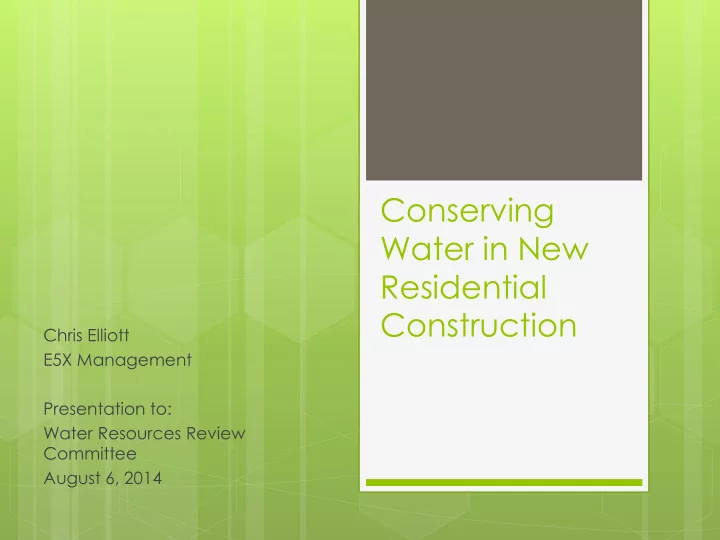

Conserving Water in New Residential Construction Chris Elliott E5X Management Presentation to: Water Resources Review Committee August 6, 2014
Home Building & Landscape Water Conservation The home building industry recognizes water as a limited, valuable and vital resource. Home builders have been working for decades on measures to conserve water in landscaping. “New urbanism” and higher -density development is becoming a highly marketable product in the Front Range. It is often the developer, and not the municipality, that is responsible for acquiring new water supplies.
Overview: Residential Water Use Accounts for only 5-7 percent of all water used in Colorado Note: This figure includes all “municipal” uses Outdoor uses (irrigation) constitute roughly 55 percent of water used in homes One acre foot of water can support anywhere from 2.5-3 new homes. Residential water conservation is a critical part of addressing the state’s water supply problems, however, it is only a small part of the overall picture.
Water Conservation: State Statutes HB 04-1365 – Water Conservation Act of 2004 SB 05-100 – Increased Protection for Homeowners HB 08-1141 – Sufficient Water Supplies for Land Use Approval HB 10-1204 – Conservation Standards in the Plumbing Code HB 10-1358 – Mandatory Offers of Water Conserving Fixtures, Appliances and Landscaping SB 14-103 – Phase-in High-Efficiency Water Fixtures
Water Conservation: Local Ordinances Tap fees, assessed for the purpose of acquiring water and developing infrastructure, are often (especially post-2002 drought) tied to water conservation in a variety of ways Local landscaping, building and plumbing codes are allowed to exceed state standards – and often do Local regulations relative to irrigated open space requirements, greenbelts, can be counterproductive to water conservation Requirements for residential fire sprinklers have potential to increase demand/tap sizing calculations, impacting water need projections
Water Conservation: What’s Missing? None of these statutes have addressed three critical elements in conserving water used in residential landscaping: What should be done with older homes (pre- 2000) that do not include water-efficient fixtures and landscaping irrigation? What can be done to improve homeowner’s behavior and choices? What can be done to improve efficiency and conservation by water suppliers themselves?
Home Buyers & Water Conservation: Lessons Learned Studies have shown (including one by Wright Water Engineers) that home buyers grossly overwater their lawns, impacting not only structural integrity of the home but also stormwater run-off. Home buyers have a low tolerance with regard to increased costs relative to water- saving fixtures and landscaping. “DIY” homeowners are notorious for tinkering with sprinkler settings and pressure-regulating valves.
Water Conservation: Lessons Learned Addressing leaks and high-water use fixtures in older homes is a critical part of reducing residential water use. Policy makers need to be aware of factors that can frustrate water conservation mandates: Market-availability of products; Cost of products; Acceptance by consumers/homeowners (e.g. aesthetics of natural grasses and drought-tolerant vegetation)
In Conclusion… Colorado’s home builders have been working for decades to provide homes with state-of-the-art, affordable water-conserving features both inside and outside the home. Developers and builders are often “caught in the middle” by local ordinances that work against water conservation efforts. Until water providers and elected officials are willing to acknowledge the water loss and waste that occurs with older, existing housing stock, Colorado will make little progress in residential water conservation.
Recommend
More recommend